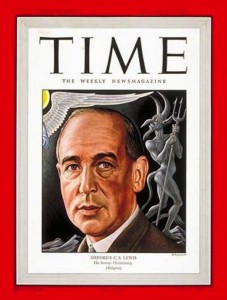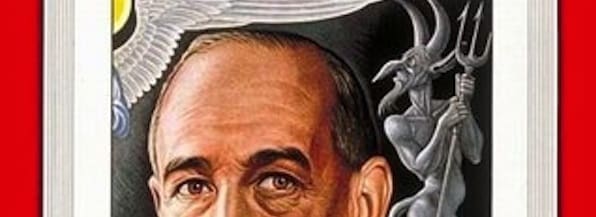On a Friday evening in July, 1940, CS Lewis and a friend listened to Hitler on the radio. Lewis wondered if he was  weaker than other people since he found that, while the speech lasted, it was hard not to believe what Hitler was saying. He marveled how statements which he knew to be lies sounded convincingly true as long as they were spoken “unflinchingly.”
weaker than other people since he found that, while the speech lasted, it was hard not to believe what Hitler was saying. He marveled how statements which he knew to be lies sounded convincingly true as long as they were spoken “unflinchingly.”
It shouldn’t be too much of a surprise, considering this experience and the intensifying war with Germany, that an idea would come to Lewis about devils.
In a letter to his brother Warnie he explained that he’d been sick but finally felt well enough to attend his local Anglican church after weeks away. He admitted that the sermon that morning was not particularly profitable. Perhaps his mind wandered. But at some point in the service Lewis had “an idea for a book which I think might be both useful and entertaining.” The title he entertained was As One Devil To Another. It would be a compilation of letters from “an elderly retired devil to a young devil who has just started work on his first ‘patient.’”
The inspiration of the idea struck him so powerfully that he began to work out the details. The letters would explore “the psychology of temptation” from a diabolical point of view. He even presented Warnie with a sample, sketching out a few thoughts about prayer and faith. Capturing the devil’s “voice,” he referenced God as “the Enemy.” These snippets would eventually wind up in what became The Screwtape Letters – a work that has become a Christian classic, regardless of what kind of Christian the reader may be.
And that’s part of the wonder of CS Lewis. He had the uncanny ability to integrate a variety of theological views into a cohesive version all his own, and yet proclaim that version as somehow representative of what most Christians actually believe. Protestants who read The Screwtape Letters are surprised by how “Catholic” they are. Even Catholics are surprised by how “Catholic” they are.
Make no mistake: Lewis was no Catholic. And, in my opinion, he would never have become one. Yes, he was sympathetic to Catholics, especially since some of his best friends were, or had become, “Papists.” JRR Tolkien was instrumental in persuading Lewis about the truth of Christianity. The writings of GK Chesterton were a huge influence on him. But, having dug through his writings and letters in my research for the various projects I’ve written related to Lewis, I have found too many anti-Catholic sentiments to believe it was within Lewis to ever cross the Tiber.
But…what about all those “Catholic” ideas in The Screwtape Letters and some of Lewis’ other works? To answer that question, it’s worth giving an over-simplified description of Anglicanism.
We all know the story of Henry VIII and how he wanted yet another divorce so he could have a male heir and how the Pope at the time refused him. Henry then decided to reject the Pope’s authority in England and set himself up as the head of the church there.
As so often happens in government and corporations when the Big Boss makes a huge decision, the underlings have to scramble to make sense of it all. In the case of the Church of England, it meant creating a system of theology that was suitable to the sensibilities of the English. And there’s one thing that can be said about the English: they are great integrators. Rather than throw the Catholic baby out with the bath water, as the Protestants in Europe had, the English decided to bring together all the things they liked best about Catholicism and the Protestant Reformation. (There are “articles” in the back of the Book of Common Prayer that state clearly what was accepted and rejected, if you ever want to read them.)
This is the Anglicanism that CS Lewis knew. Though, admittedly, Lewis himself continued the tradition established by Henry VIII and did his own picking and choosing in the English banquet hall of theological delights.
The good news for Lewis, and for us, is that his sharp mind, astute critical faculties, and very humane spiritual insights combined to create some of the best and most accessible Christian works of the 20th century. He made it easy to look past any theological differences we might have so we could explore a common experience of faith.
Catholic or Protestant, it would be diabolical to miss his work.
PS From Dan: Paul, in collaboration with the Lewis estate has produced a new edition of the Screwtape letters that is annotated to in order to help the modern reader better absorb all that Lewis was seeking to reveal in this brilliant work. Paul has also produced the best dramatized audio edition of this work available.




